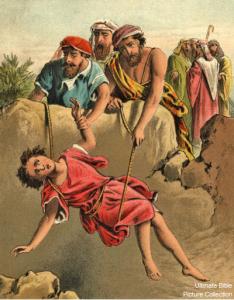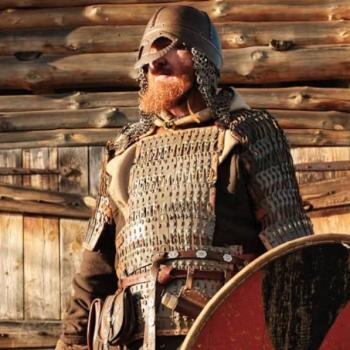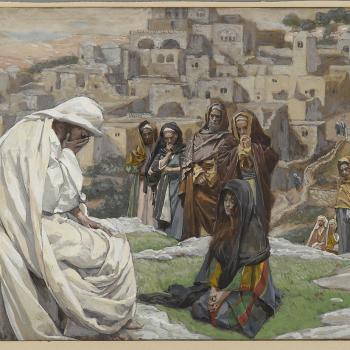 The Joseph saga in the last third of Genesis tells us something about how God works. It’s not the way we’d expect. God accomplishes great things with flawed human material, even through the flaws themselves. Instead of the tragic flaw of Greek plays, the Bible gives us the “happy fault.”
The Joseph saga in the last third of Genesis tells us something about how God works. It’s not the way we’d expect. God accomplishes great things with flawed human material, even through the flaws themselves. Instead of the tragic flaw of Greek plays, the Bible gives us the “happy fault.”
Episode 9 of the Rowing with Michael Series: A journey through the Jewish/Christian Scriptures in Verse and Commentary. Introduction and Contents for this series HERE.
Michael, row the boat ashore. Alleluia….
- Joseph wanted to weep and wail. Alleluia.
- First in the pit and then in jail. Alleluia.
- He knew what Pharaoh’s nightmares meant. Alleluia.
- Next thing he’s practically president. Alleluia.
If you had been one of Joseph’s brothers in this story, you would have found many things to dislike about him, starting with the fact that he was the favorite of his father, Jacob.
Dysfunctional families
That puts the spotlight on Jacob so let’s look at him first. He is the grasping twin who came out of his mother Rebecca’s womb second grabbing onto his slightly older brother Esau’s heal. He’s the mean-spirited brother who wouldn’t feed his starving twin unless he gave up his birthright. He’s the liar who pretended to be Esau to get his blind father Isaac’s blessing. There would be nothing left for Esau.
This Jacob later on has no idea of the dissension he’s causing among his own children by playing favorites. He gives Joseph, the only child of his favorite wife, Rachel, a fancy coat. He lets him stay home while his 10 brothers work the fields. Abraham even lets Joseph revel in his grandiose dreams of being worshiped by his brothers. Jacob and Joseph are two of my favorite Bible characters; they’re so human.
Grandfather Abraham has his share of human frailty, too. First he’s the model of the true believer. He doesn’t waiver in his faith in God’s promise to make of him a great nation even when God tells him to sacrifice his only son, the son of his extremely old age. Then he goes down to Egypt, and, because his wife is pretty, he instructs her to lie to Pharaoh and tell him she’s Abraham’s sister. That way Pharaoh can have her for his wife without necessarily killing Abraham. A wee bit of a lapse of faith in God’s promise there, if you ask me. And what is God’s response? He punishes Pharaoh instead of Abraham. Abraham gets rewarded with rich gifts from none other than Pharaoh himself. Abraham learns his lessons well. He goes and finds another occasion to do the same thing, and his son Isaac does it once as well.
Flawed heroes and providence
Whoever gave us these stories was pretty intent on spelling out the ancestral heroes’ flaws. There is a theme here that runs through the Bible. Being God’s choice is no reason to brag. It’s hardly ever based on merit. God chooses in a way that goes against our expectation. We’d expect God to choose the top of the line. Instead it’s a couple too old to have children. It’s the second or the youngest son. It’s the flawed character and even the flaw itself. God looks squarely at all human things and settles down right in the midst of them.
Israelites considered themselves to be under a strict obligation to give glory to God. There could be no such thing as hero worship for them. I don’t think you would have found among them a great concern for positive self-image. Their favorite image was of times when God was with his people, faults and all.
The Joseph story takes up about the last third of the book of Genesis. It’s not history but great literature. Maybe a couple hundred years after this story was set down, Greek playwrights were coming up with some great literature, too. (It could have been a couple hundred years before—there’s disagreement about when these Bible stories were written.) Greek heroes also had flaws, tragic flaws that always led to their downfall. The Fates would see to that. But the Bible introduces us to the “happy fault,” the flaws through which God is pleased to work. Because of Joseph’s insufferable dreams and his brothers’ violent response and even because of the wiles of Potiphar’s wife that landed Joseph in jail, a nation is able to survive through famine. The story moves Israel’s imagined ancestors to Egypt, where further turns of fortune await them. But it’s providence, not fate that moves the world.
- God has work for me and you.
- We’re not perfect, but we’ll have to do.
Image credit: Bible Encyclopedia











